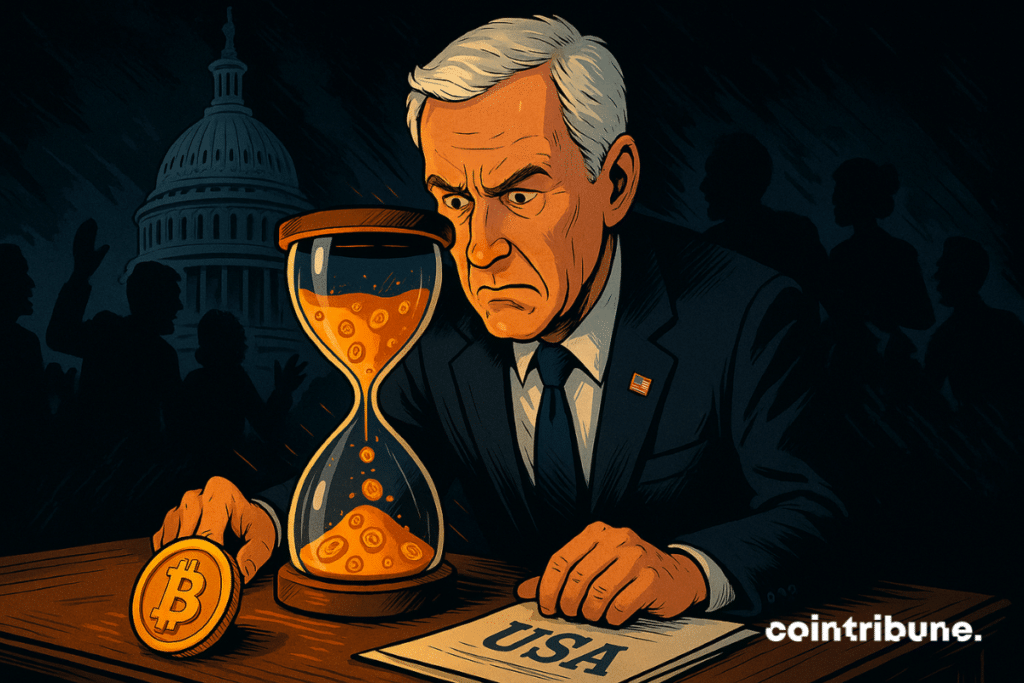10:05 a.m. ▪
5
min read ▪ by
Time is passing dangerously fast for the US Congress. As the federal government undergoes a historic shutdown, Republican Senator Thom Tillis is issuing a stark warning: the window to pass crypto legislation will only stay open for a few more weeks. Then it will be too late. What makes this deadline so critical?


Brief
- Republican Senator Thom Tillis believes that Congress must act before February 2025 to pass crypto regulations.
- The 2026 midterm elections risk paralyzing any legislative progress on digital assets.
- The government shutdown further complicates the situation, notably delaying SEC approvals for crypto ETFs.
- Several major bills, including the House-passed CLARITY Act, still await consideration by the Senate.
Crypto law, race against time in the US Congress
Thom Tillis, a Republican senator from North Carolina and a leading member of the Banking Committee, issues an unequivocal warning. Congress has at most a few months to advance crypto regulation.
“By the first half of January, February,” he specifies according to Bloomberg, emphasizing the urgency of acting during the current session which will end in January 2027.
The political context seriously complicates things. The government shutdown, which began in early October after the failure of budget negotiations between Republicans and Democrats, is already blocking many files.
Mike Johnson, Speaker of the House, continues to delay parliamentary business. This administrative paralysis comes at the worst time for the crypto sector, which hoped to see several major pieces of legislation finalized this year.
Tillis is particularly pessimistic about the chances of progress. “I am not optimistic that we will make further progress on anything related to digital assets, stablecoins or cryptocurrencies in this Congress.“, he confides.
His analysis is based on an unavoidable political reality: the 2026 midterm elections will transform the legislative landscape into an electoral battlefield, making consensus almost impossible.
Major projects left on hold
Several crucial pieces of legislation await their turn in the Senate. The CLARITY Act, passed by the House of Representatives last July, was supposed to establish a clear regulatory framework for the crypto market structure. The Senate leaders had promised to “build on” this text to develop their own version. But time is running out and nothing is moving.
Republican Senator Cynthia Lummis, a leading figure on the crypto issue within the banking committee, remains optimistic. She said before the shutdown that her version of the bill, called the Responsible Financial Innovation Act, would become law by 2026. A gamble that now seems increasingly risky amid political impasse.
Despite the budget blockade that has paralyzed Washington for nearly a month, Senate Democrats are trying to maintain their momentum.
A roundtable with executives from Kraken, Coinbase, Ripple and Circle is planned to restart discussions on market structure. This initiative shows that, even in times of crisis, the crypto sector retains an important place in legislative priorities.
The shutdown also slows down SEC decisions regarding crypto ETFs. The agency, operating with reduced staff, had to postpone the examination of several files, including the Litecoin and HBAR ETFs from Canary Capital which nevertheless seemed close to approval.
A strategic appointment at stake
In the midst of this turmoil, one nomination attracts attention. Donald Trump has appointed Michael Selig to head the CFTC, one of the most influential financial regulators in the US crypto industry.
This Commodity Futures Trading Commission plays a major role in monitoring digital asset companies. However, Selig’s confirmation hearing was not on the Senate schedule as of Monday, another illustration of the backlog.
The paradox is striking. While the Trump administration shows its support for the crypto sector and multiplies positive signals, Congress is struggling to translate these intentions into concrete legislative texts. Companies in the sector remain in regulatory uncertainty, while investors turn to safe havens such as Bitcoin and gold.
In short, the window of opportunity is closing quickly. If Congress does not act by February, the US crypto industry will have to wait until at least 2027 to hope to have the clear regulatory framework it has been demanding for years. A wait which could prove costly in terms of competitiveness compared to more reactive jurisdictions.
Maximize your Cointribune experience with our “Read to Earn” program! For every article you read, earn points and access exclusive rewards. Sign up now and start enjoying benefits.
Passionate about Bitcoin, I like to explore the intricacies of blockchain and cryptos and I share my discoveries with the community. My dream is to live in a world where privacy and financial freedom are guaranteed for everyone, and I firmly believe that Bitcoin is the tool that can make this possible.
DISCLAIMER
The views, thoughts and opinions expressed in this article belong solely to the author and should not be considered investment advice. Do your own research before making any investment decisions.



